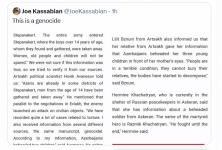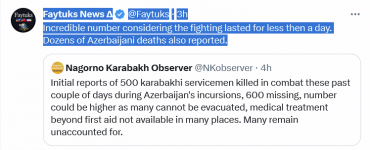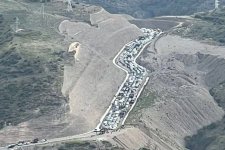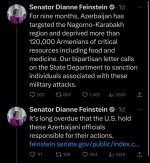What to know about the Azerbaijan-Armenia conflict in Nagorno-Karabakh
ExplainerWhat you need to know about Azerbaijan-Armenia conflict in Nagorno-Karabakh
Azerbaijan’s seizure of Nagorno-Karabakh from Armenian rebels in a lightning military operation this week has set the stage for a shift in the balance of power in the South Caucasus, a region sitting at the junction of Central Asia, Europe and the Middle East.
The capitulation of some 10,000 separatist fighters on Wednesday, just a day after Azerbaijan launched its “counterterrorism operation”, came hours after Armenia declined to intervene on their behalf.
This seems to have staved off the prospect of a third war between Azerbaijan and Armenia over the mountainous region since its seizure by Armenian forces and separatists some three decades ago, in a conflict triggered by the dissolution of the Soviet Union.
[Armenian policemen stand guard outside the government building during a protest against Azerbaijan’s military action in the Nagorno-Karabakh region. Photo: EPA-EFE]
Armenian policemen stand guard outside the government building during a protest against Azerbaijan’s military action in the Nagorno-Karabakh region. Photo: EPA-EFE
Russian military peacekeepers also declined to intercede this week, leaving Armenian separatists with little choice but to accept Azerbaijan’s demand that they surrender, abandon their weapons, and leave Nagorno-Karabakh.
Parallel to this, Azerbaijan and its closest ally Turkey have renewed pressure on Armenia to live up to its commitment to cooperate in building a trade and connectivity corridor, which would link the two countries overland to Turkey via Nagorno-Karabakh.
The opening of the route would also potentially benefit China by expanding connectivity infrastructure along the so-called “Middle Corridor”, linking to Europe via Central Asia and the South Caucasus.
Here are four things you need to know about the conflict in Nagorno-Karabakh and its political ramifications.
EU tries to push Azerbaijan-Armenia peace as Russia offers more talks
Why did Azerbaijan seize Nagorno-Karabakh?
The Azerbaijani military initiated its military operation on Tuesday, hours after a landmine planted by Armenian separatists killed four Azerbaijani soldiers and two civilians in Nagorno-Karabakh.
The most pressing stories and in-depth analysis from the Asia region, sent to you each week.
By submitting, you consent to receiving marketing emails from SCMP. If you don't want these, tick here
But the offensive was “the result of decades of frustration after the failure of the international community to resolve the conflict” in Nagorno-Karabakh, said Luke Coffey, a senior fellow at the Hudson Institute, a Washington-based think tank.
In part, the timing of Azerbaijan’s operation was “no coincidence”, he said.
It coincided with the annual meeting of the United Nations General Assembly in New York, ensuring that Azerbaijan would succeed in the Nagorno-Karabakh issue reaching the global stage, Coffey added.
Also, winter is coming to the mountains so Azerbaijan had “a limited window of opportunity” in which to pursue a military option, Coffey said.
[Armenian law enforcement officers stand at a checkpoint on a road leading to Azerbaijan’s Nagorno-Karabakh region, near the village of Kornidzor, Armenia September 22, 2023. REUTERS/Irakli Gedenidze]
Armenian law enforcement officers stand at a checkpoint on a road leading to Azerbaijan’s Nagorno-Karabakh region, near the village of Kornidzor, Armenia September 22, 2023. REUTERS/Irakli Gedenidze
After a 44-day war with Armenia in 2020, Azerbaijan “liberated much of its internationally recognised territory”, said Yusuf Erim, a political analyst based in Istanbul.
However, “the military solution was never complimented and recognised with a peace deal”.
Over the ensuing three years, issues such as a demarcation of borders, the removal of landmines, access to transport corridors and the future of Armenian residents were left unresolved, he said.
“In addition to this uncertainty”, the presence of an Armenian separatist entity and their continued efforts for autonomy and militarisation were “viewed as a national security threat and challenge to Azerbaijan’s territorial integrity”, Erim added.
In choosing to send in its forces, Azerbaijan has used the military superiority over Armenia it has enjoyed since the 2020 war.
Azerbaijan sets up first checkpoint on only land route to Armenia
Even though Armenia belatedly recognised Azerbaijan’s sovereignty in Nagorno-Karabakh in May, “Azerbaijan has used its military advantage for diplomatic advantage”, said John Herbst, a former ambassador to Ukraine and Uzbekistan and now senior director of the Eurasia Centre at the Atlantic Council, a US think tank.
While Azerbaijan’s control over its sovereign territory in Nagorno-Karabakh should be “normal state affairs”, he said, the onus is on it to “seek a way based on negotiations and law” to accommodate the needs of the ethnic Armenian community.
Azerbaijan should also “advance a lasting peace settlement with Armenia”, he said.
Will Russia lose influence in the Caucasus?
Moscow’s influence in Armenia has diminished since “standing by while Azerbaijan won the 2020 war”, said Herbst, a former US ambassador to Ukraine.
Azerbaijan’s military superiority over Armenia has been “enabled by Turkey, whose influence in the South Caucasus is on the rise”, in large part linked to its friendliness with Russia – Ankara buys weapons from Moscow and refuses to join US-led sanctions against Vladimir Putin’s regime.
[Azerbaijan’s military superiority over Armenia has been “enabled by Turkey, whose influence in the South Caucasus is on the rise”, in large part linked to its friendliness with Russia – Ankara buys weapons from Moscow and refuses to join US-led sanctions against Vladimir Putin’s regime. Photo: Reuters]
Azerbaijan’s military superiority over Armenia has been “enabled by Turkey, whose influence in the South Caucasus is on the rise”, in large part linked to its friendliness with Russia – Ankara buys weapons from Moscow and refuses to join US-led sanctions against Vladimir Putin’s regime. Photo: Reuters
Turkey has also sought to negotiate the normalisation of ties between Azerbaijan and Armenia.
Meanwhile, Russia has been “losing influence in the region for the last year and a half because of the problems it is facing in Ukraine”, said the Hudson Institute’s Coffey.
With its forces engaged there, Moscow has “little extra bandwidth or resources to focus on other regions of the world, including the South Caucasus”.
“This is probably one of the reasons why Azerbaijan decided to be so forceful,” Coffey said.
With Russia distracted, Azerbaijan calculated that the Russian peacekeeping force in Nagorno-Karabakh “wouldn’t get involved if fighting broke out, and so far it looks like that has been the case”.
Moscow now stands to lose “a lot more influence in the Caucasus”, Coffey said.
If Armenia and Azerbaijan can normalise relations, over the course of a generation, you’ll see a shift of Armenia away from being aligned with Russia, and probably more aligned with Europe and the West
Luke Coffey, Hudson Institute
“If Armenia and Azerbaijan can normalise relations, I think over the course of a generation, you’ll see a shift of Armenia away from being aligned with Russia, and probably more aligned with Europe and the West.”
But Turkish analyst Erim said this view understates Russia’s historic influence in the South Caucasus, including the ceasefire it brokered between Armenia and Azerbaijan in 2020.
Since assuming a peacekeeping role between the two parties, Russia has “tried to remain balanced in its position on Karabakh”, he said.
Armenian criticism has been aimed at Russian peacekeepers for not intervening, “but to militarily engage with Azerbaijani units would not only exceed the peacekeeping mandate, it would also escalate tensions and end Russia’s status as a neutral party”, Erim said.
“Despite the criticism, I highly doubt Russia will lose any influence in the region as both Armenia and Azerbaijan are dependent on and have many mutual interests with Moscow,” he said.
[Armenian policemen detain a protestor of Azerbaijan’s military actions in the Nagorno-Karabakh region. Photo: EPA-EFE]
Armenian policemen detain a protestor of Azerbaijan’s military actions in the Nagorno-Karabakh region. Photo: EPA-EFE
Why have Israel and Turkey strengthened Azerbaijan’s military?
Shia Muslim-majority Azerbaijan has enjoyed close relations with mostly Sunni Turkey and the Jewish state of Israel since it declared independence from the Soviet Union in 1991.
Primarily, these bilateral relationships are based upon strong cultural connections.
Azerbaijan is one of Turkey’s closest allies “as both countries share a common history, culture and root language”, Erim said.
Azerbaijan and Israel, meanwhile, have a “very close relationship” due to the fact that Azerbaijan is “home to the largest all-Jewish settlement in the world outside the State of Israel”, known as the Caucasus Jews, Coffey said.
Will ‘disaster diplomacy’ soften Turkey’s stance on Middle East rivals, China?
Azerbaijan’s independent relationships with Israel and Turkey have evolved into strategic partnerships.
Azerbaijan provides Israel with about 40 per cent of its crude oil needs, and “they are united over concerns regarding Iran”, he said.
Both Israel and Turkey have played key roles in strengthening Azerbaijan’s military “for different reasons”, Erim said.
Azerbaijan borders Iran, where there are millions of ethnic Azerbaijanis.
With Azerbaijan being such an important customer of Israeli weapons and also a Shia majority country, like Iran, it is “a tremendously strategic partner for Israel”, said Erim.
As such, strengthening Azerbaijan’s military and ensuring that it has a formidable presence on Iran’s northern border is “a security interest for Tel Aviv”.
These developments have angered Iran, which has warned against any attempt by Azerbaijan to use control of the Zangezur Corridor connecting Azerbaijan to Nagorno-Karabakh via Armenian territory as a pretext to block Iran’s overland access to Armenia and onwards to Russia.
Meanwhile, Ankara’s support for Azerbaijan “not only receives great domestic support in Turkey, it always serves many strategic interests”, Erim said.
Ankara has worked to increase its influence in Central Asia, “a geography that is referred to as the Turkic World”, and Turkey’s strong support and role in helping Azerbaijan to victory in the Karabakh War “has resonated throughout the region”, Erim said.
[People take part in an anti-government rally in downtown Yerevan, following Azerbaijani military operations against Armenian separatist forces in Nagorno-Karabakh. Photo: AFP]
People take part in an anti-government rally in downtown Yerevan, following Azerbaijani military operations against Armenian separatist forces in Nagorno-Karabakh. Photo: AFP
How will Azerbaijan’s gains affect connectivity corridors?
Once Azerbaijan restores full control over Nagorno-Karabakh, and stability and peace is brought to the region, “this could benefit trade corridors and connectivity across the Eurasian land mass”, Coffey said.
“Right now, there is a very limited way for goods to travel between East and West if you want to avoid Iran and Russia.”
If the dust settles in Nagorno-Karabakh, “you could see” a widening of the Middle Corridor, which runs from China through Central Asia and into Europe via Azerbaijan, and Armenia “getting involved”.
“It could help transform transit and trade in the region,” Coffey said.
China’s Central Asia rail link a potential answer to Russia headache
Erim said peace and stability in the South Caucasus is important for Turkey “due to the critical geography, transport routes and energy pipelines that run through the region and have been planned for the future”.
The supply chain shocks and trade route blockages experienced during the global Covid pandemic and war in Ukraine have led many countries to review trade and transport through the lens of national security, he said.
As such, “we have entered into a period” where many countries and blocs have begun to renew and build their infrastructure to protect or gain a place on supply chains and trade routes.
With the so-called North Corridor -which runs through Russia – experiencing issues due to the war in Ukraine, “the Middle Corridor, which is the quickest and cheapest route from China to Europe, has gained importance”, Erim said.
This week’s offensive was due to ‘decades of frustration after the failure of the international community’ to resolve conflict, say analysts, and with the war in Ukraine distracting Russia.

www.scmp.com



 They're losing everything. How long until Azerbaijan invades them wholesale?
They're losing everything. How long until Azerbaijan invades them wholesale?








